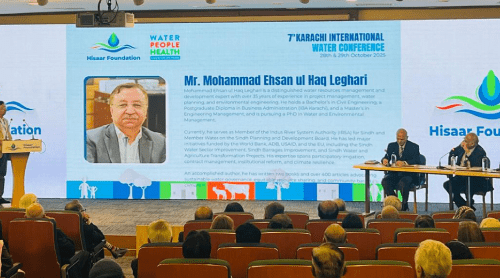KARACHI: Over 93% of water is used for agricultural purposes in Pakistan while about 7% is used for drinking, industries, and other purposes. There is a dire need to improve water management and reduce water wastage.
This was the crux of the 7th Karachi International Water Conference organized by Hisaar Foundation entitled as Water, People and Health at Karachi School of Business and Leadership on Tuesday. The conference was attended by national and international water, health, and environment experts.
Speaking at the conference, Simi Kamal, Chairperson of the Hisaar Foundation, a non-profit organization, said that the world is today undergoing ecological disasters, dwindling biodiversity, boiling oceans, melting glaciers, and polluted ground and surface water.
She said: “We have unexpected and intense changes in water regimes and water cycles. Seasons are shifting, natural regions have been distorted, there’s loss of ecosystems, and major threats to rivers. The clarion call now is for returning to nature and to nature-based solutions, free-flowing rivers, and breaking the status quo of the dominant capitalist systems that has finally been acknowledged as the principal cause of climate change in the Anthropocene age.”
Ms Simi said perceptions about rivers are also changing. Rivers have had a profound influence on civilizational development. She said recognizing our interdependence through both blue and green water flows is now being talked about. People are talking about minimal water requirements for a dignified life, not just for production. And new water provision is first to those who are left behind.
She said that the recent devastating floods in Pakistan resulted in a loss of valuable lives, caused severe economic and social impact, and led to billions of dollars in damages. The disaster also destroyed infrastructure and led to widespread poverty and a health crisis.
Simi said: “Today, irresponsible behavior of sections of people in Pakistan is deepening existing inequalities and propelling new ones. Mismanagement across different sectors, and rapid population growth has left Pakistan quite water-stressed. These are not merely ecological failures, but also political ones that determine who gets water and access to water, and how decisions are made. The urgency to address the interconnections between water, people, and health has never been greater than it is now. This 7th Karachi International Water Conference is designed as a platform for coming up with actionable solutions.”
She said: “The time for ‘Think Global, Act Local’ is long gone. We are replacing it with what should have been patently and intuitively obvious: ‘Think Local, then make it the call for Global Action.”
Environment expert Afia Salam said that women in Sindh are managing water, and they perform difficult works. She said that most of the problems are man-made. The women’s participation should be ensured in problem-solving platforms as they have great potential.
Senator Javed Jabbar said that there is a need to strengthen the local government system in Karachi and other parts of the country to resolve water, sanitation, and other issues. He said that the provincial governments usually do not want to hold local elections on time, and they delay those elections, which is not a good omen, adding this trend should be ousted now.
He expressed concern that less than 50 people take part in local elections, which is too low. There is need of full participation of people, particularly youth, in the local government elections.
Syeda Malaika Zehra, a youth population supporter from the NED University of Engineering and Technology, said youth are a generation of activism, so they should not be treated as social media activists. She said that we are facing a burden of problems which need to be resolved on a priority basis.
She said that women should also be given a chance to participate in the solution. She said that most of the courses in universities and other education institutes are outdated; they should be updated, and skill training should be provided to students for the progress of the country.
Ashraf Kapadia, a Council Member of Hisaar Foundation, said that Pakistan is facing water shortage due to rising population. Water is life; therefore, it is the responsibility of everyone to conserve it, he said. He said that Hisaar Foundation has rehabilitated hundreds of schools and villages in Pakistan.
Muhammad Ehsanul Haq, Member IRSA for Sindh, said that Pakistan is facing a water governance problem. The natural waterways have been encroached across Pakistan for agriculture purposes, schemes, and other factors, which need to be opened to avoid flood impacts.
“What we are doing since the last 60 years is not correct,” he added. “If we had learned from the 2010 and 2022 floods, there would have been no such huge losses due to recent floods,” he added.
The Second Plenary session, titled “Citizens’ Commission on Floods: Impact on Water, People and Health”, was chaired by Senator Mushahid Hussain. The dramatic session aimed to hear what the young have to say by underscoring the rationale behind the conference theme — “Water, People and Health” — and its relevance to Pakistan and the wider region.
Framed as a “charge sheet against society”, a video was shown posing the question: “Aap hamare liye kaisi duniya chhor kar ja rahe hain?” — What kind of world are you leaving for us?
Addressing the issue from all its different angles and highlighting their detrimental impact, were Ehsan Leghari, Rafay Alam, Yasmeen Qazi, Noman Ahmed, Afia Salam, Hammad N Khan, and Syeda Malaika Zehra. Wrapping up the session were Commission members, Senator Javed Jabbar, Senator Mushahid Hussain, and Simi Kamal. Javed Jabbar stressed the importance of local government playing its role, and Mushahid Hussain pointed out that Pakistan reacts in exactly the same way – with three Cs — whenever a natural disaster strikes: Condolence, Compensation, and Commitment from foreign donor agencies. It never learns that in the long run, this modus operandi does not serve the country.
Additionally, sessions on the streams of Water for People, Water for Health, and Water Justice took place. Topics covered were ‘Advancing South-South Cooperation’ Health and Food Security, Role of Private Sector in Water, Water Borne Diseases in Flood Times, and Indus Water Treaty and Indus Water Apportionment Accord. Notable speakers included Dr Pervaiz Amir, Dr Awlad Hussain, Dr Akissa Bahri, Johan Gely, Dr Fazilda Nabeel, Dr Mohammad Ashraf, Dr Jai Das, Bashir Anjum, Farrah Naz, Mahmood Nawaz Shah, Dr Sonia Murshed, Ali Tauqeer Sheikh, Favad Soomro, Nazish Shekha, Amir Masood, Waqar Hussain, Imran Aslam, Ayesha Aziz, Shahrukh Nadeem, Sameen Akhund, Dr. D.S. Akram, Shazina Masud, Dr Afia Zafar, Dr Xaher Gul, Dr Abid Aman Burki, Dr Lubna Naz, Dr Syed Aziz-ur-Rab, Nasir Panhwar, Rashida Dohad, and Faiz Kakar.







